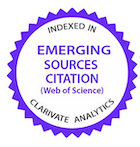Qualidade bacteriológica de ovos contaminados com Pseudomonas aeruginosa e armazenados em temperatura ambiente ou refrigerados
DOI:
https://doi.org/10.1590/1089-6891v15i431244Palavras-chave:
, contaminação bacteriana, estocagem, ovos comerciais, refrigeraçãoResumo
Objetivou-se verificar o efeito da sanitização e da temperatura de armazenamento sobre a qualidade bacteriológica de ovos contaminados experimentalmente com Pseudomonas aeruginosa. Foram utilizados 240 ovos brancos em esquema fatorial 2 x 2 (lavados ou não e refrigerados ou não). Os ovos foram sanitizados com água quente contendo clorhexidina 20% e teor ativo 8% de cloro. Após a sanitização, foram contaminados com 1,5 x 105 unidades formadoras de colônia (UFCs) de Pseudomonas aeruginosa/mL de solução e armazenados a 5 oC ou 25 oC por 30 dias. A cada dez dias foram realizadas análises bacteriológicas e contagens de Pseudomonas aeruginosa na casca e conteúdo. Foi realizada análise de variância e as médias comparadas pelo teste de Tukey. Pseudomonas aeruginosa foi isolada da casca e do conteúdo em todos os ovos, independentemente dos tratamentos. No entanto, quando os ovos foram sanitizados e armazenados a 5 ºC apresentaram menor contagem bacteriana na casca e no conteúdo. Houve alta correlação entre Pseudomonas aeruginosa presente na casca com a presença no conteúdo do ovo quando os ovos não foram sanitizados e resfriados. Concluiu-se que para reduzir o crescimento bacteriano de Pseudomonas aeruginosa, os ovos devem ser sanitizados e mantidos a 5 ºC durante o armazenamento de 30 dias.
PALAVRAS-CHAVE: contaminação bacteriana; estocagem; ovos comerciais; temperatura.
Downloads
Publicado
Como Citar
Edição
Seção
Licença
Copyright (c) 2014 Ciência Animal Brasileira / Brazilian Animal Science

Este trabalho está licenciado sob uma licença Creative Commons Attribution 4.0 International License.
Autores que publicam nesta revista concordam com os seguintes termos:
- Autores mantém os direitos autorais e concedem à revista o direito de primeira publicação, com o trabalho simultaneamente licenciado sob a Licença Creative Commons Attribution que permite o compartilhamento do trabalho com reconhecimento da autoria e publicação inicial nesta revista.
- Autores têm autorização para assumir contratos adicionais separadamente, para distribuição não-exclusiva da versão do trabalho publicada nesta revista (ex.: publicar em repositório institucional ou como capítulo de livro), com reconhecimento de autoria e publicação inicial nesta revista.
- Autores têm permissão e são estimulados a publicar e distribuir seu trabalho online (ex.: em repositórios institucionais ou na sua página pessoal) a qualquer ponto antes ou durante o processo editorial, já que isso pode gerar alterações produtivas, bem como aumentar o impacto e a citação do trabalho publicado (Veja O Efeito do Acesso Livre).






























